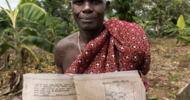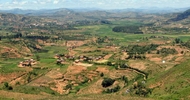
Reining in land grabbers of dumbing down the debate?
By GRAIN
Over the last few years, governments, legislators and political elites in a number of countries have been trying to calm anger and debate over land grabbing by setting legal limits on foreign direct investment (FDI) in land. These limits take various forms.
- In some countries, governments are imposing ceilings on the amount of farmland foreigners may acquire. Argentina and Brazil have recently moved in this direction. Before leaving office in 2011, President Lula instructed his party and the country's Attorney General to find a way to limit access to farmland by foreigners in Brazil. Cristina Kirchner initiated a similar process in Argentina, resulting in the signing of a new law within a year. In both cases, the intent was to set limits on the amount of agricultural land foreign investors can own as a way to contain growing resentment about "foreignisation" and loss of sovereignty.
- In other countries, political leaders are introducing bans on foreigners getting farmland. The president of Hungary recently pushed a decree through parliament which states that foreigners will not be allowed to buy land when a moratorium on land sales to foreigners is lifted in 2014. Hungary, like many other East European countries joining the European Union, was given a transition period before it would have to open up its currently closed land market to European investors. As that period comes to an end, Hungary's conservative ruling party clearly wants to find a way to keep the wealth that can be extracted from the country's rich agricultural land to itself. In Latin America, Uruguay's government has been debating whether to ban "public" foreign investors, i.e. land deals involving foreign governments, sovereign wealth funds or state-owned enterprises.
- Elsewhere, other kinds of restrictions are being set up. In Algeria, where the state owns much of the land, a new law was recently adopted to introduce more private ownership of agricultural land. Foreigners, however, will not be allowed to acquire farmland except as minority shareholders, in partnership with domestic firms. This same kind of limitation was included in the Democratic Republic of Congo's 2012 land code. To limit speculation, some governments or legislatures are imposing land use requirements (e.g. if you do not bring land into production within a certain time limit, you will lose your rights to it).
Obviously, the situations differ from country to country. Some leaders and political groups are reacting specifically – and sometimes in knee jerk fashion – to rising numbers of large scale land deals where foreigners are seen as a particular problem for one reason or another. Others are trying to address a broader range of problems related to land – not just land grabs but land concentration, land use issues, systems of property registration and valuation – through more holistic land laws, including pastoral and rural codes.
Restrictions on foreign investment in land appear to fly in the face of neoliberal doctrine, as promoted by Western governments and international financial institutions over the last few decades. After all, most bilateral investment treaties and the investment chapters of so-called free trade agreements hinge on the notion of "national treatment" – the idea that foreign investors should be treated the same as nationals, with no discrimination allowed. These moves, while not widespread, seem to disregard that principle.
Why such restrictions may be ineffective
But will these restrictions make a difference, especially for small-scale food producers struggling to feed their families and communities? It is unlikely, for a number of reasons.
Ownership versus rent: In many cases, the restrictions being set up apply only to the purchase of land. Investors can easily shift to other forms of control over land for their projects, such as leases or concessions. For many communities, however, there is no difference. A company getting a 99-year lease over your territory or lands, especially without your explicit and direct consent, has the same effect as if the company had bought the land – it's still dispossession. Even if and when consent comes into play, a long-term lease, which could span several generations of a community's life, has the same impact as a permanent transfer of ownership. Politicians are playing a game with words, saying they are addressing the problem (by restricting ownership) when they are not (by allowing long-term leases).
Foreigners can hide behind nationals: This is a well-known trick, which goes by many names and variants around the world. Where foreigners – be they individual people or legal entities – are barred from owning land, they can simply hide behind domestic actors. A local company or citizen may serve as a legal front or signatory to a deal, while behind the scenes other papers will be drawn up to reflect that the money and ownership really lies with someone else. For larger deals, foreign companies can open up domestic subsidiaries or shell companies, or go into a joint venture with local companies and appear as a national entity. Such practices are widespread, from Thailand (where it is called the nominee system) to Brazil (where the front entity is called an orange). These practices are not necessarily illegal, but they do mean that laws clamping down on "foreign" ownership may not have a huge impact.
Direct land grabbing can give way to indirect land grabbing: Smart investors that feel threatened by emerging restrictions on foreign direct investment in land can change strategy and shift to other models of land or resource control.
In Argentina, another Chinese group, the Heilongjiang Beidahuang State Farms Business Trade Group, took a similar approach in 2010. The governor of Rio Negro signed an agreement with the Chinese group promising 20,000 ha of "unused" land under 20-year lease plus access to a further 235,000 ha held by private farmers. The plan was that Beidahuang would negotiate long-term exclusive rights to the farmers' produce, without buying or renting their lands.
Whether framed as contract production or outgrower schemes, these stealthier forms of land grabbing still divert land from serving local agendas and communities' needs – sometimes for a very long time indeed.
In yet other cases, legal restrictions on foreigners have been circumvented by re-zoning or reclassifying lands, or by breaking up land transactions into smaller deals that fly under the radar of regulators. Again, the form of land grabbing may change to comply with the law, but the net effect is the same.
Restrictions on investment can hijack the debate: In many cases we see that where political elites seek to introduce limits on foreign investors as a way of controlling land grabbing — usually with a lot of nationalistic or pro-sovereignty flair — they can actually reduce the debate at the national level to one of "foreigner = bad", while evading the more fundamental question of what kind of agriculture, food security or rural livelihoods strategy is being promoted and supported. All this achieves is the vilification of a few actors in a show of “doing something”, when in fact all sorts of other structural biases in a country's agricultural direction may remain intact!
It is risky, therefore, to let the issue of foreign investors become a main focus.
Conclusion
Land grabbing has become a structural plague of our time alongside equally important and interconnected processes such as growing land concentration and other forms of resource grabbing.
Limiting foreign direct investment in land is not a bad thing as such. But as we can see from flawed attempts in a few countries so far, it would be better to take a more holistic approach and come up with new land policies within a broader recasting of agricultural and rural development strategies that include genuine agrarian reform programmes oriented toward food sovereignty. Otherwise, we may continue to get superficial fixes fraught with legal loopholes, perverse effects and extremely narrow debates that boost the reputations of politicians but fail to actually solve any problems for local communities on the ground.
In the annex, we provide snapshots of how restrictions against foreigners grabbing farmland are taking shape in various parts of the world.
Annex: State restrictions on foreigners getting farmland
Algeria – banned
Algeria reformed its land laws in 2010 to allow private leasing of agricultural land, most of which belongs to the state. Foreigners, however, may not own agricultural land. They can team up with Algerians to jointly lease land, or to directly invest up to 49 percent of the capital of large scale agricultural projects, and possibly engage in contract farming. This is similar to the new rules adopted in the Democratic Republic of Congo.
Argentina – ceiling + security limits
In December 2011, following an initiative put forward by President Cristina Kirchner, a large majority of congress adopted National Law No. 26737. The law establishes a national ceiling: foreigners cannot own more than 15 percent of the country's farmland. It also establishes that foreign investors and companies from any given country cannot own more than 30 percent of that amount, while individual companies or investors cannot hold more than 1,000 ha each. Foreigners cannot possess land within a security limit inside the country's borders or alongside large permanent water bodies, the law says. In addition, it stipulates that under the bilateral investment treaties to which Argentina is party, the acquisition of rural land cannot be considered "investment" because land is a non-renewable natural resource provided by the host country.
Australia – large deals subject to review
In Australia, the issue of foreign investors getting control over farmland has become a hotly debated issue in the last few years, with polls showing that four out of five Australians are against it. At present, only the biggest land deals – those with a price tag of AU$ 244 million (US$ 252 million) or more – require the approval of the Foreign Investment Review Board. Anything less goes unregistered and unregulated. Some farmers associations want the review threshold brought down to AU$5 million (US$ 5.3 million). The Greens and other political parties are backing a proposal to introduce a moratorium on foreign investors buying Australian farmland unless any given deal passes a "national interest" test, proving that their position is not xenophobic. In October 2012, the government announced that – to increase transparency, and following the examples of the governments of Queensland, the US and Argentina – it would create a register of foreign owners of Australian farmland based on a national consultation.
Benin – ceiling
Benin's legislators debated and adopted a new land law in January 2013. The proposal from the government was prepared through the support of the US government's Millennium Challenge Corporation and presented to parliament in October 2012. It initially stated that Benin-based foreigners may rent or take out long-term leases (for up to 50 years, non renewable) on farmland subject to a quantitative cap. The proposal put the cap at 1,000 hectares per person, whether physical or moral. Civil society groups, represented through the mass-based "Alliance for a consensual and socially just land law" wanted a ban on foreigners getting rights to land and wanted the ceiling lowered to 50 hectares for individuals and 100 hectares for associations. The final text endorsed by parliament did not budge on this point: land deals involving more than two hectares will require authorisations (on a scale ranging from the local district to the national level, depending on the surface area), with a maximum limit per investor nationwide of 1,000 ha.
The new code also lays down requirements on the use of land to help fight speculation and promote sustainable development. It says that leases and concessions must be linked to development projects that respect ecological balances and contribute to environmental protection and food security. These projects are expected to be approved and monitored by local or municipal authorities.
Bolivia – public banned, private allowed
Foreigners in Bolivia cannot acquire state lands, but they can acquire private lands. Local residence is required and land rights are protected by international investment treaties (where these have been signed between Bolivia and a given foreign country).
Brazil – ceiling + security limits
In August 2010, Brazil's attorney general issued a re-interpretation of a 1971 law, which had not been enforced, that would limit sales of farmland to foreigners to "50 modules", roughly equal to 5,000 ha. The decision called for strict enforcement of the law, saying foreigners could not own more than 25 percent of any municipality. No more than 10 percent of a municipality could be owned by foreigners of the same nationality, and the same rules should also be applied to Brazilian agricultural companies with more than 50 percent foreign capital. These proposals are still moving through congressional committees and not yet resolved. Meanwhile, the government has published a framework set of guidelines that require foreigners or foreign companies with authorisation to work in Brazil to provide documentation justifying the amount of land they want to purchase, to improve the national registries. Apart from these land ceilings, frontier areas – a strip of 50 km inside the national borders of Brazil – are "no go" zones, off limits to private investors wishing to acquire land, for national security purposes.
Colombia – ceiling under debate
Parliament is in the process of debating various proposals. The proposal from the Alternative Democratic Pole (Robledo) was to amend the constitution to limit the amount of farmland foreigners can own to "one family unit". It also clarified that unused land shall be considered state property and can only be rented or utilised (e.g. through usufruct arrangements) by native Colombians. The Conservative Party (Andrade) also proposed a constitutional amendment to limit purchases by foreigners. The Ministry of Agriculture, on the other hand, argued for an ordinary law instead of a constitutional amendment to deal with the matter. In late December 2012, the National Union party's proposal (Lozano) to limit the amount of land that foreigners can purchase to "15 percent of a municipality's rural area" was approved by the congress's fifth commission, and will probably be examined together with a proposal from the administration in early 2013. June 2013 is the deadline to finalise all this.
Democratic Republic of Congo – ban or backslide?In June 2012, a new land code came into effect in the DRC. Under its terms, only Congolese citizens or companies that are majority-owned by Congolese nationals are allowed to hold land. As of early 2013, the rules for implementation of this measure had still not been developed and the government is already talking about modifying it, apparently, under heavy pressure from foreign investors to give them greater rights. According to the UN news agency IRIN, the government may even be contemplating buying land itself in order to sell it to foreign companies.
Ecuador – ceiling under debate
The government is currently considering a land bill which may outlaw the establishment or transfer of land ownership by/to foreign entities, people or capital beyond the amount of 300 ha.
Hungary – ban
In July 2012, the government led by Conservative Prime Minister Viktor Orban submitted a bill to parliament which aimed to ban foreigners from buying farmland once a moratorium is lifted in 2014. Social movements, however, say it will accelerate landgrabbing in Hungary. Since the beginning of its EU accession process in 1994, Hungary's land law has stipulated that foreign investors can only rent (not buy) agricultural land and they can only get 300 ha for a maximum lease period of ten years.
Yet loopholes and cronyism have led to a situation where more than one million hectares are currently controlled by foreign investors, mainly Austrian farmers (600,000-700,000 ha) but also Dutch, German, Danish, British and other farmers and companies as well. This represents 15-20 percent of all the agricultural land in Hungary. In December 2012, parliamentadopted the bill, which modifies the constitution.
"This is the beginning of a new era for agriculture. The Constitution protects Hungarian farmland, our heritage and the basis of our livelihoods, from foreign and domestic speculators alike," said the Ministry of Rural Development when announcing the decision. Opponents of the regime contend, however, that the move is meant to help deflect attention from the real process going on in Hungary whereby farmland is being concentrated and privatised in the hands of local political elites and ruling party patrons. The amendments will come into effect in May 2014 when the EU moratorium is lifted (unless the general election scheduled to take place in March 2014 prompts a change of tack).
New Zealand – large deals subject to review
Any farmland purchase bigger that five hectares or worth more than NZ$ 100,000 (US$ 84,000) by a foreign investor must get clearance from the Overseas Investment Office. To get clearance, overseas investors have to meet various criteria, such as demonstrating relevant experience, good character and the value of the investment for New Zealand. This is not that hard to do, and approximately 10 percent of the country's farmland has already been sold off. With the recent rise in agribusiness investor interest from China and Gulf states in particular, there has been strong debate about how to control foreign investment in domestic farmland.
Paraguay – ceilings under preparation, until coupIn 1940, the Paraguay Land Act made it illegal for foreigners to own land. This was scrapped by military dictator Alberto Stroessner in the 1960s and since then Paraguay's countryside has attracted a steady inflow of foreign agribusiness companies, farmers and investors, which peaked in 2006-2010. In principle, only Paraguayans can get control of land redistributed through the agrarian reform programme, but this has not been enforced. Similarly, the Paraguayan parliament passed a law in 2005 that stated foreigners should not be able to buy land within 50 km of the border, but this was not respected or implemented either.
Only in October 2011 did the Lugo administration issue a decree to put parliament's act into practice, in an effort to regain control of a runaway situation where foreigners control 9-10 million hectares of farmland or 25-30 percent of all the arable land in Paraguay. In December 2011, President Fernando Lugo made it clear that he planned to propose legislation along the same lines as that which had just been adopted in Argentina and was under development in Brazil. Lugo's ouster in mid-2012 by agribusiness-aligned forces put an end to such intentions.
Peru – no limits for foreigners
Since 2012, Peru's parliament has been considering two bills to limit the concentration of land ownership, which has exploded recently. The bills do not include limits regarding nationality, though some of the big new land grabbers in Peru are foreign investors like Parfen of Uruguay. Like Brazil, Peru's constitution holds that no foreigners may own or possess land within 50km of its border, although exceptions are possible.
Poland – measures under debate
The moratorium on the sale of Polish farmland to foreign European interests will expire in 2017. In the meantime, citizens of the EU-27, Iceland, Liechtenstein and Norway can buy up to one hectare of agricultural land without a permit. Any greater land area requires approval from the government and shall not be subject to ownership but lease. Right now, the leasing rules as well as the situation to be put in place post-moratorium are under review.
Romania – ceiling
In October 2012, the centre-left government announced that when the domestic market is liberalised in 2014 as per EU rules, it plans to either impose a quantitative ceiling on foreign investors wanting to acquired farmland in Romania or require that they have actual experience in agriculture. This, after 800,0000 ha — or 6 percent of the country's entire agricultural area — have already been signed off to foreign agribusiness concerns.
Rwanda – ceilings
Rwanda is preparing a new land law that aims to limit farmland leases to foreigners to a maximum of 49 years. As in other African countries, like Sudan or Benin, it will also establish requirements on the use of land, e.g. foreign investors will have five years to bring the land into production or face repossession.
Tanzania – ceilings
In Tanzania, no foreign investor was supposed to hold more than 50 acres. However, this ceiling was not respected.
In 2012, parliament urged the government to suspend all large scale land allocations to foreign investors. Starting in January 2013, there are ceilings imposed on long-term land concessions by foreigners and domestics alike. For sugar, the ceiling is 10,000 ha and for rice 5,000 ha. Additionally, the Tanzania Investment Centre is in the process of publishing guidelines for the functioning of a national land bank and allocations of land.
Ukraine – ceilings under debateThe government of Ukraine will be lifting its moratorium on the sale of farmland to foreign investors in 2013. In preparation for this, several controversial pieces of legislation have been prepared. For example, one relating to the cadastre system was debated and adopted, while another relating to the land market is still to be finalised. Until now, foreigners have not been allowed to buy farmland but they have been allowed to rent it from individual farmers on a longterm basis. For this, they were required to set up a business identity/operations in Ukraine and it was understood that once the EU moratorium was lifted they would have the right to buy the land they had leased.
In this way, much land has been signed off to foreign investors in Ukraine (over one million hectares or 3 percent of the country's agricultural area). In the drafts of the new rules to govern the land market, various ceilings and tax schedules have been proposed. It is not clear, however, what the final rules will be when the moratorium is lifted.
Uruguay – ban vs ceiling under debate
The Socialist Party has proposed a bill that forbids the purchase of farmland for agricultural or forestry purposes by foreign governments or companies linked to foreign governments. The ruling coalition, Frente Amplio, proposed another bill that seeks to limit the amount of farmland that foreign private companies can acquire, with a particular view to stopping speculators. The debate is still under way.













